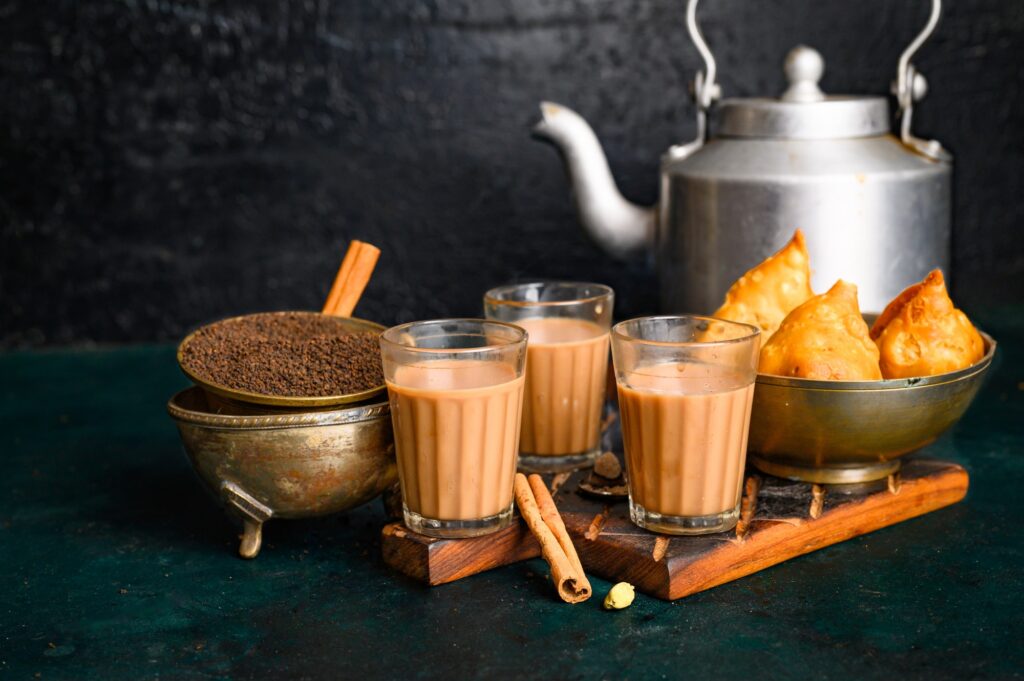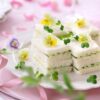
Are you ready to embark on a flavor-filled journey of authentic chai? Look no further than black tea, the aromatic powerhouse that forms the heart and soul of this beloved beverage. In this ultimate guide, we will unravel the secrets of using black tea to create a chai that will transport your taste buds to the bustling streets of India.
Black tea, known for its robust and bold flavor, provides the perfect base for chai, elevating its character and depth. Whether you prefer the malty notes of Assam or the floral nuances of Darjeeling, black tea offers a variety of options to suit your taste preferences.
But using black tea for chai is more than just steeping a tea bag in hot water. It’s about embracing the art of infusion, combining spices like cardamom, cinnamon, ginger, and cloves to create an aromatic symphony that awakens the senses.
So join us as we unleash the potential of black tea in crafting a truly authentic and flavorful cup of chai. Get ready to savor the rich aroma, indulge in the vibrant flavors, and discover the true essence of this timeless beverage. Let’s dive in and explore the fascinating world of black tea chai together!
The history and cultural significance of chai
Chai holds a special place in the hearts of many, not only for its delectable flavors but also for its rich history and cultural significance. Originating in the Indian subcontinent, chai has been a staple in Indian households and a symbol of warmth and hospitality for centuries.
Chai, derived from the Hindi word for tea, has a fascinating story that dates back thousands of years. It is believed to have been introduced to India by the British during the colonial era, but it quickly became an integral part of Indian culture, surpassing its colonial origins.
In India, chai is more than just a beverage; it is a social ritual that brings people together. It is often enjoyed during lively conversations, shared with friends and family, and served to welcome guests. The art of making chai has been passed down through generations, with each household adding its unique touch to the recipe.
Different types of black tea for chai
Black tea, known for its robust and bold flavor, provides the perfect base for chai, elevating its character and depth. There are various types of black tea available, each with its own distinct flavor profiles. Understanding the different types of black tea can help you choose the perfect one for your chai.
One of the most popular black teas for chai is Assam. Grown in the northeastern region of India, Assam tea is known for its malty and robust flavor. It adds a boldness to chai that pairs well with the spicy and aromatic ingredients.
Another favorite is Darjeeling black tea. Grown in the foothills of the Himalayas, Darjeeling tea has a delicate and floral flavor. It lends a subtle complexity to chai, adding a touch of sophistication to the brew.
Apart from Assam and Darjeeling, there are other black teas that can be used for chai, such as Ceylon, Keemun, and Nilgiri. Each of these teas has its own unique characteristics, so feel free to experiment and find the one that resonates with your taste buds.
Traditional ingredients for making authentic chai
Using black tea for chai is more than just steeping a tea bag in hot water. It’s about embracing the art of infusion, combining spices like cardamom, cinnamon, ginger, and cloves to create an aromatic symphony that awakens the senses.
Cardamom, with its warm and citrusy notes, is the star of the chai spice blend. It adds a distinct flavor and fragrance that is synonymous with authentic chai. Cinnamon, with its sweet and woody aroma, complements the cardamom, enhancing the overall depth of the brew.
Ginger brings a subtle heat and earthiness to the mix, while cloves contribute a warm and slightly pungent flavor. These spices work together harmoniously, creating a medley of flavors that dance on your palate with each sip.
Apart from the spices, milk and sweeteners are essential components of chai. Traditionally, chai is made with whole milk, which adds a creamy and velvety texture to the brew. However, you can use alternative milk options like almond milk or oat milk to suit your dietary preferences.
When it comes to sweetening your chai, there are various options available. White sugar is commonly used, but you can also experiment with alternatives like honey, agave syrup, or even jaggery for a more traditional touch.
The art of brewing black tea for chai
Brewing black tea for chai requires a delicate balance of time, temperature, and technique. To unlock the full potential of the tea leaves and spices, it is important to follow the right process.
Start by bringing water to a boil in a saucepan. Once the water reaches a rolling boil, add the tea leaves and spices. Let the mixture simmer for a few minutes to allow the flavors to infuse.
Next, add the milk to the saucepan and continue to simmer gently. The milk will add a creamy richness to the chai while mellowing out the spices. Be sure to keep a close eye on the chai to prevent it from boiling over.
After simmering for a few minutes, remove the saucepan from the heat and strain the chai into cups or teapots. This step helps remove the tea leaves and spices, leaving behind a smooth and aromatic beverage.
Remember, the brewing process is not set in stone. Feel free to experiment with the brewing time, temperature, and the ratio of tea to spices to find your perfect balance of flavors.
Enhancing the flavor of chai with spices and herbs
While the traditional chai spice blend forms the foundation of authentic chai, there is room for experimentation and creativity. Adding additional spices and herbs can elevate the flavor profile of your chai, giving it a unique twist.
One popular addition is black peppercorns. Adding a pinch of freshly ground black pepper to your chai can bring a subtle heat and complexity to the brew. It pairs exceptionally well with the other spices, adding an unexpected kick to each sip.
For those who enjoy a touch of sweetness, a sprinkle of nutmeg or a dash of vanilla extract can work wonders. These ingredients add a layer of warmth and sweetness that complements the existing flavors in the chai.
If you’re feeling adventurous, you can also explore the world of herbal infusions. Adding herbs like lemongrass, fennel seeds, or even rose petals can create a chai with a refreshing twist. These herbal additions infuse the chai with their unique flavors, taking your taste buds on a delightful journey.
Sweetening options for chai lovers
When it comes to enjoying a cup of chai, the choice of sweetening options can make all the difference. While some prefer the traditional method of using sugar, others may opt for healthier alternatives like honey or maple syrup. Here are a few options to consider:
- Sugar: The classic choice for sweetening chai, sugar adds a delightful sweetness that complements the bold flavors of black tea and spices. Whether you prefer white sugar, brown sugar, or even jaggery, adding a spoonful or two can enhance the overall taste of your chai. Adjust the amount according to your preference, keeping in mind that too much sugar can overpower the flavors.
- Honey: For those looking for a natural and healthier option, honey is a great alternative to sugar. Its unique flavor profile adds a subtle sweetness and a touch of floral notes to the chai. Experiment with different varieties of honey, such as wildflower or clover, to find the perfect balance.
- Maple Syrup: If you’re a fan of a rich and caramel-like sweetness, maple syrup is an excellent choice. It adds a distinct flavor that pairs well with the earthiness of black tea and the warmth of the spices. Be mindful of the intensity of maple syrup, as a little goes a long way.
- Stevia: For those watching their sugar intake, stevia is a natural sweetener derived from the stevia plant. It provides a sweetness without the calories, making it a suitable option for those on a low-sugar or diabetic-friendly diet. Start with a small amount and adjust to taste, as stevia can have a slightly bitter aftertaste.
Remember, the choice of sweetening option can greatly impact the overall taste of your chai. Experiment with different options to find the perfect balance that suits your palate.
Popular variations of chai from around the world
Chai is a globally beloved beverage, with each region putting its own unique spin on the classic recipe. From the streets of Mumbai to the tea houses of Morocco, here are a few popular variations of chai from around the world:
- Masala Chai (India): Masala chai is the quintessential Indian chai, known for its bold flavors and aromatic spices. It typically combines black tea with a blend of spices like cardamom, cinnamon, ginger, cloves, and black pepper. This rich and creamy chai is often enjoyed with a splash of milk and a touch of sweetener.
- Karak Chai (Middle East): Karak chai, meaning “strong tea” in Arabic, is a popular beverage in the Middle East. It is made by boiling black tea leaves with a mixture of spices like cardamom, cinnamon, and saffron. Karak chai is known for its strong and robust flavor, often enjoyed with a generous amount of evaporated milk and sweetened with sugar.
- Thai Iced Tea (Thailand): Thai iced tea is a refreshing and indulgent version of chai that has gained popularity worldwide. It combines black tea with sweetened condensed milk, giving it a creamy and smooth texture. The tea is often brewed with spices like star anise and tamarind, resulting in a unique and flavorful blend.
- Yuenyeung (Hong Kong): Yuenyeung is a popular Hong Kong-style beverage that combines black tea with coffee. It is made by mixing equal parts of black tea and freshly brewed coffee, resulting in a unique blend of flavors. Yuenyeung is often enjoyed with a splash of milk and sweetened with sugar or condensed milk.
These are just a few examples of the diverse variations of chai that can be found across the globe. Each variation offers a unique twist on the traditional black tea chai, showcasing the versatility and adaptability of this beloved beverage.
Embracing the aromatic power of black tea in homemade chai
Black tea is the aromatic powerhouse that forms the heart and soul of authentic chai. Its robust and bold flavors provide the perfect base for crafting a cup of chai that awakens the senses and transports you to the bustling streets of India.
By embracing the art of infusion and combining black tea with a blend of spices, you can unlock the true potential of chai. Experiment with different varieties of black tea, such as Assam or Darjeeling, to find the flavor profile that suits your taste preferences. And don’t forget to explore the world of sweetening options, from sugar to honey, to add the perfect touch of sweetness to your chai.
Whether you prefer the traditional masala chai of India or the indulgent Thai iced tea, there’s a chai variation out there to suit every palate. So go ahead, unleash the aromatic power of black tea in your homemade chai and embark on a flavor-filled journey that will delight and satisfy your taste buds. Cheers to the art of chai-making and the incredible world of black tea!






